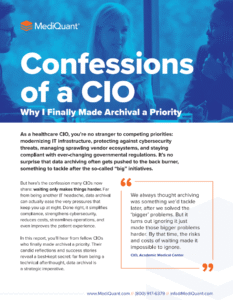Generative AI Underlines Continuing Value of Healthcare Data Archiving Solutions
Written By: Jim Jacobs, President and CEO, MediQuant
An AI platform that turns clinicians notes into structured data within seconds. A virtual assistant that gathers 20,000 nurse handoffs per shift.
AI in healthcare is no longer just hype — it’s actively being implemented to enhance clinical care and operational efficiency. Generative AI offers health systems and hospitals the ability to derive more value from patient claims, monitor payers more closely, equip physicians with useful information at the point of care, and much more.
Driving these advancements, however, requires relevant data — even hospital archive data from 10 or more years ago — that has been normalized and made available to current software. Preserving data in a central repository ensures it’s continually accessible and usable by hospitals to bolster finances, improve workflows, and take better care of patients.
1. Keeping Payer Scorecards for Oversight

2. Recovering Revenue Via Denial Management
3. Helping Physicians at the Point of Care
How Health Data Archiving Enables Data Usefulness
Many hospital executives still imagine an archive at the center of various legacy systems, with arrows pointing from legacy systems to a central repository where information is stored as systems are retired. There are no arrows leading from the repository. In this view, an archive is static, the place where archived data goes to die.
With the rise of generative AI, however, executives are realizing that historic data retains its value for much more than compliance and release-of-information use. While arrows should lead from legacy applications to the data repository, arrows should also emanate from the repository, fueling secondary uses that include billing and collections, patient care, claims management, and medical research.

But not all healthcare data archiving solutions are created equal. For data to be useful for secondary purposes and tactical use cases, it must be discrete, accurate, and reliable — traits that not all archive vendors can meet.
More Thought-Leadership
Emerging Tech Innovation in Digital Health
Emerging technologies like AI, telemedicine, and predictive analytics are how healthcare systems deliver care. In this article from Heatlhcare IT Today, MediQuant's Vice President of Innovation and Collaboration, Dr. Shelly Disser, DBA, is featured along with several...
Seal the Data Archival Deal—How to Pitch Your Archival Project Like a Shark Tank Pro
When you’re pitching a winning strategy to the boardroom—like modernizing your data archival strategy—it can feel like you’re facing a bunch of sharks. Even when the strategic imperative is crystal clear, before your very eyes, your CEO suddenly transforms into...
Why EHR Data Extraction Makes or Breaks Health Data Archival
EHR data extraction seems simple until it isn't. Pulling data from one application and moving it to another is routine in IT transitions—so why does it frequently become the Achilles' heel? Failed extractions can unravel IT projects because without clean, usable data,...
Contact Us Today








